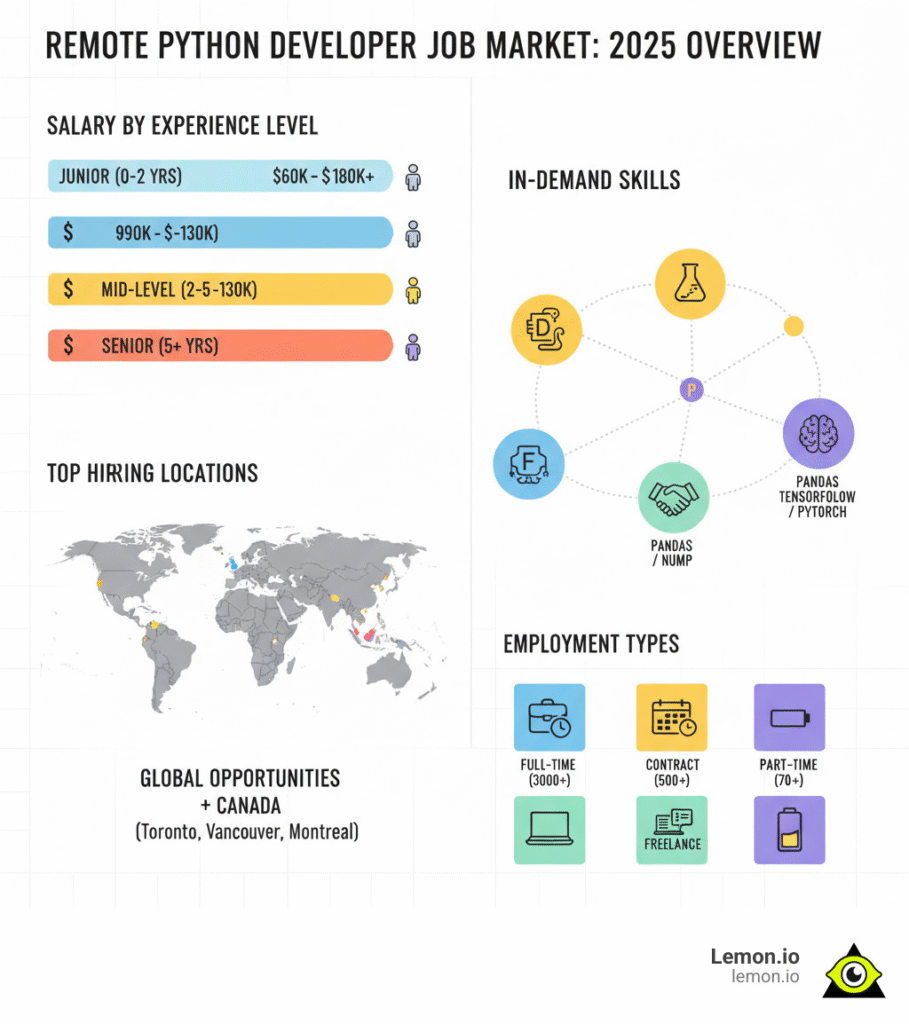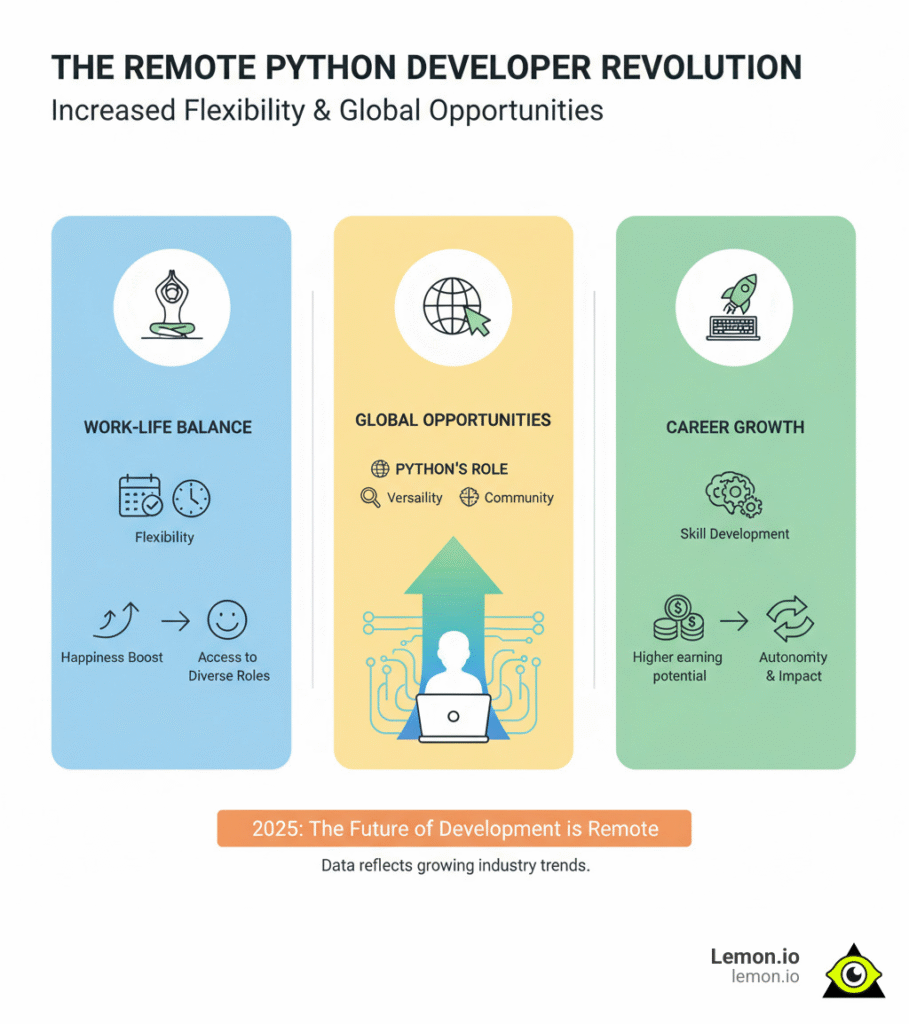Remote python developer opportunities have exploded across the global job market, with over 3,000 positions available in Canada alone and tens of thousands more worldwide. This shift represents more than just a trend – it’s fundamentally changing how companies build software and how developers craft their careers.
Top Remote Python Developer Opportunities:
- Full-time roles: 3,045+ positions with competitive salaries ($80,000-$150,000+)
- Contract positions: 554+ flexible engagements for specialized projects
- Freelance work: Project-based opportunities with top-tier companies
- Part-time roles: 73+ positions offering work-life balance
- Key locations: Toronto, Vancouver, Montreal, and remote-first companies globally
The numbers tell a compelling story. Top-tier companies and specialized talent networks are actively seeking elite developers, with some platforms reporting new job posts daily. This isn’t just about working from home – it’s about accessing global opportunities, higher pay scales, and flexible career paths that traditional office-bound roles simply can’t match.
Python’s versatility makes it particularly well-suited for remote work. Whether you’re building web applications with Django, analyzing data with Pandas, or developing machine learning models with TensorFlow, Python’s extensive ecosystem supports the kind of independent, results-driven work that thrives in remote environments.
I’m Aleksandr Volodarsky, and I’ve helped scale Lemon.io from $2.7M to $10M by connecting companies with top-tier remote python developer talent globally. Through this experience, I’ve seen how the right remote Python developers can accelerate startup growth and solve complex technical challenges across industries.

The Perks: Why Go Remote with Python?
The allure of becoming a remote python developer is undeniable, and for good reason. It’s not just about escaping the morning commute (though we certainly appreciate that!). It’s about a fundamental shift in how we approach our careers, offering a suite of benefits that improve both our professional and personal lives. We’re talking about a world where our workspace can be anywhere with a decent internet connection and a good coffee machine.
The Advantages of a Remote-First Career
Let’s explore why so many of us are choosing the remote path.
- Autonomy: One of the biggest draws is the freedom to structure our day. We get to decide when our peak productivity hours are and tailor our work schedule around them. This level of control over our work environment fosters a sense of ownership and responsibility that can be incredibly motivating.
- Reduced Commute Stress: Remember the daily grind? Traffic jams, crowded public transport, the constant rush? As remote developers, we wave goodbye to that stress. That time saved can be reinvested into hobbies, family, or simply an extra hour of sleep. It’s amazing what a difference it makes to our mental well-being.
- Customizable Workspace: Our office is exactly how we want it. Dual monitors, ergonomic chair, a plant on the desk, or even working from a cozy corner of a cafe – the choice is ours. This personalized environment can significantly boost comfort and focus, leading to better work.
- Access to Top-Tier Companies: The world truly becomes our oyster. We’re no longer limited by geographical boundaries, meaning we can apply to and work for the best companies globally, regardless of where they’re physically located. This opens doors to incredible projects and career advancement opportunities that might otherwise be out of reach. The demand for high-caliber remote talent is clear, with many companies actively seeking the best developers, wherever they may be.
- Why Companies Hire Remotely: It’s not just good for us; it’s great for businesses too. Companies gain access to a wider, more diverse talent pool, allowing them to find the perfect fit for specialized roles. They can also often achieve significant cost savings, sometimes slashing overheads by 60% or more by hiring remote Python developers. This mutual benefit has fueled the rapid growth in remote positions.

Python’s Perfect Fit for Remote Work
Python’s inherent characteristics make it an ideal language for remote development teams.
- Versatility: Python is a true chameleon, adapting to almost any development challenge. From web backends to data analysis, machine learning, and automation, its broad applicability means a remote python developer can tackle diverse projects without needing to switch languages.
- Strong Community Support: The Python community is vast, active, and incredibly supportive. This means that even when working remotely, help and resources are always just a few clicks away. Forums, documentation, and open-source projects provide a collaborative environment that transcends physical distance.
- Extensive Libraries: One of Python’s superpowers is its rich ecosystem of libraries and frameworks. Need to build a web app? Django or Flask have us covered. Dive into data science? Pandas, NumPy, and Scikit-learn are our best friends. Automate tasks? Selenium and BeautifulSoup are ready. This wealth of tools makes development faster and more efficient, a huge plus in a remote setup where self-sufficiency is key.
- Suitability for Web Development, Data Science, and Automation: These are prime areas for remote work, and Python excels in all of them. Its clear syntax and powerful libraries simplify complex tasks, making it easier for remote teams to collaborate on intricate projects.
- Rapid Prototyping: Python’s ease of use and extensive libraries allow for quick iteration and prototyping. This agility is invaluable in remote environments where feedback loops might be asynchronous, enabling us to demonstrate progress and adapt quickly.
The Toolkit: What Skills Make a Successful Remote Python Developer?
Becoming a successful remote python developer isn’t just about knowing Python inside out. It’s about combining robust technical expertise with a suite of soft skills that enable seamless collaboration and independent productivity. Think of it as having a well-stocked toolbox, where every tool serves a specific, crucial purpose.
Imagine your career journey as a well-oiled machine. Each skill you acquire is a vital cog, helping you steer projects, solve tricky problems, and truly shine in a remote setting. It’s about being effective, reliable, and a joy to work with, no matter where you are.

Essential Technical Skills for a Remote Python Developer
Our technical foundation is paramount. Without these core skills, our Python journey would be a bumpy one. These are the nuts and bolts that let you build amazing things.
First up is Python fundamentals. This is your bread and butter – a deep understanding of Python’s data types, structures, functions, modules, and object-oriented programming (OOP) principles is non-negotiable. You should feel comfortable with Python 3, as it’s the standard for modern development. The official Python documentation is an excellent resource for mastering these concepts.
Next, for any development team, especially a remote one, Version control (Git) is your lifeline. Think of Git as your project’s history book, letting you track changes, collaborate without chaos, and easily revert if something goes sideways. Proficiency in branching, merging, and pull requests ensures smooth teamwork and code integrity.
Most applications need to store and retrieve data, making Databases (SQL, NoSQL) a crucial skill. You’ll want to be familiar with relational databases like PostgreSQL or MySQL, often using ORM libraries like SQLAlchemy. Knowing your way around NoSQL options like MongoDB is also a huge plus.
The cloud is where modern applications live. That means experience with Cloud platforms (AWS, GCP, Azure) is highly sought after. Knowing how to deploy, manage, and scale applications on major providers like Amazon Web Services (AWS), Google Cloud Platform (GCP), or Microsoft Azure, including services like EC2, S3, and Lambda, really sets you apart.
Finally, to build reliable software, you need to master Unit testing and Debugging. Writing robust, testable code using Python’s built-in unittest module or frameworks like pytest is a hallmark of a professional developer. When things go wrong (and they will!), strong debugging skills are essential. Knowing how to effectively use debuggers and interpret error messages saves countless hours and keeps projects on track. These skills are all about problem-solving – breaking down issues and building solid solutions.
In-Demand Python Frameworks and Libraries
Python’s ecosystem is vast, but certain frameworks and libraries consistently dominate the demand for remote python developer roles. Mastering these will significantly boost your marketability across various specializations.
If you’re aiming for Web Development, you’ll likely encounter Django – a high-level framework that encourages rapid development and clean design, perfect for complex, database-driven web applications. For lighter, more flexible projects, Flask is a great choice. And for building blazing-fast APIs, FastAPI is quickly becoming a favorite.
For those drawn to Data Science, you’ll want to get cozy with Pandas, the go-to library for data manipulation and analysis, and NumPy, which is fundamental for numerical computing. When it comes to machine learning, Scikit-learn offers a comprehensive toolkit for various algorithms.
If Automation is your game, Selenium is a powerful tool for automating web browsers, essential for web scraping and testing. Meanwhile, BeautifulSoup is your friend for pulling data out of HTML and XML files, often paired with requests for web scraping.
And for the increasingly important world of DevOps, understanding Docker for containerizing applications and Kubernetes for managing those containers at scale is key. Tools for CI/CD pipelines (like GitLab CI or Jenkins) and infrastructure as code (like Terraform) also fall into this critical area.
Crucial Soft Skills for Remote Success
Technical prowess alone isn’t enough. Our soft skills are the glue that holds remote teams together. These are the unspoken talents that make you an invaluable team member, especially when you’re not sharing an office.
Communication is arguably the most critical skill for a remote python developer. You must be able to articulate complex technical concepts clearly, both verbally and in writing. Proactive communication, whether through chat, video calls, or detailed documentation, prevents misunderstandings and keeps everyone aligned.
Working remotely demands strong Time management and self-discipline. You need to effectively prioritize tasks, manage your schedule, and meet deadlines without constant oversight. Tools for task management and calendar blocking become your best friends here.
Proactive collaboration means actively reaching out, sharing updates, and offering help. You can’t rely on hallway conversations in a remote setup. Being a team player means contributing to discussions, reviewing code, and providing constructive feedback even when physically apart.
Critical thinking and problem-solving go hand-in-hand. As remote developers, you’re often expected to independently analyze problems, devise solutions, and implement them effectively. This requires a sharp mind and the ability to think through challenges.
A meticulous approach to coding, testing, and reviewing ensures high-quality deliverables. This is where Attention to detail truly shines, as bugs often hide in the smallest corners.
Finally, in an increasingly interconnected world, security is paramount. You must be knowledgeable about Secure coding practices in Python, including handling user authentication tokens, password management, session handling, and protecting against common vulnerabilities. This also extends to understanding and implementing federated identity protocols like OAuth 2.0, OpenID Connect, and SAML2. Being security-aware isn’t just good practice; it’s essential for protecting both your work and the company’s integrity.
The Hunt: Where to Find the Best Remote Python Roles
Starting on the quest for the perfect remote python developer role can feel like searching for a needle in a haystack. But with the right strategies and resources, we can turn that haystack into a treasure chest. The landscape is vast, with opportunities ranging from full-time positions to flexible freelance gigs.

Types of Remote Python Developer Roles
The remote job market for Python developers offers a spectrum of engagement models, each with its own advantages. Understanding these helps us choose the path that best suits our career goals and lifestyle.
Role Type |
Description |
|---|---|
Full-Time |
A permanent, salaried position with a single company, often including benefits like health insurance and paid time off. This offers stability and deep integration into a team and its projects. |
Contract |
A role for a fixed term or project, often with a higher hourly rate but fewer benefits. Contracts offer flexibility and the chance to work on diverse projects with different companies. |
Freelance |
Similar to contract work but often project-based and more independent. Freelancers are self-employed, managing their own clients, projects, and business administration. This offers maximum autonomy. |
Part-Time |
A role with fewer hours than a full-time position, offering a great balance for those with other commitments. It provides a steady income stream while leaving room for other projects or personal time. |
Where to Find High-Quality Remote Python Developer Jobs
- Vetted talent networks: Lemon.io connects companies with rigorously vetted Python engineers and offers fast matching with month-to-month flexibility.
- Niche remote job boards: Explore specialized remote job boards focused on tech roles; filter for Python and remote-only opportunities.
- General job boards: Use large employment sites and search with precise keywords like “remote Python developer” or “telecommute Python engineer.”
- Company career pages: Directly check the career pages of companies you admire, especially those known for their remote-first culture.
- Professional networks: Leverage your connections. Let your network know you’re open to remote roles and ask for referrals.









